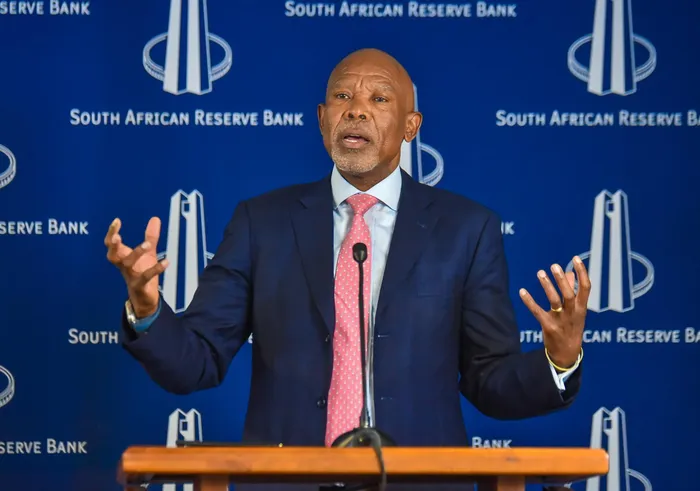
Governor Lesetja Kganyago targets inflation of 3%.
Image: SARB/Facebook
This week there was significant uncertainty about the implementation of American President Donald Trump’s 30% tariff on South African exports and in the end it was delayed by one week to August 7.
We also saw a major shift in our inflation targeting regime with the Reserve Bank announcing that future Monetary Policy Committee' (MPC) decisions would be anchored around the lower bound of the 3-6% target band.
The indicators to keep an eye on were June PPI numbers, Absa and the Bureau of Economic Research’ Purchasing Managers Index, and new vehicle sales data for July.
At Thursday’s MPC meeting the repo rate was cut by 25 basis points by a unanimous decision. The repo now stands at 7% and the prime lending rate at 10.5%. In their statement the MPC said that the economic outlook is weak despite the uptick of economic activity inthe second quarter.
With possible higher US tariffs on South Africa, the MPC's growth projection is revised down from 1.2% to 1%. For the inflation outlook they mention that the rand has strengthened, and inflation expectations have moderated.
In June the headline inflation rate was 3% and the core inflation rate 2.9%. Food inflation has risen, mainly due to meat prices and fuel prices are also falling more slowly now, compared to the recent past. The end result is that they expect headline inflation to rise over the next few months, averaging 3.3% for the year, in line with their earlier forecasts.
This benign inflation environment was echoed by the June PPI inflation rate. The producer price index (PPI) rose by 0.6% year-on-year, up from 0.1% in May. The increase was primarily driven by higher producer prices for food, beverages and tobacco products. These increased by 4% year on year and contributed 1.2 percentage points to overall producer inflation. The prices for coke, petroleum, chemical, rubber and plastic products declined by 4.7%year-on-year, subtracting 1 percentage point. On a monthly basis, PPI rose by 0.2% in June.
As for anchoring future MPC decisions around a 3% inflation rate, Governor Lesetja Kganyago noted that this was not an official National Treasury approved change in the target but rather the preference of the SA Reserve Bank (SARB). It is similar to the move to 4.5%. The June consumer inflation was in line with the preferred rate of 3%; but the SARB expects inflation to pick up over the next few months.
Looking ahead, the SARB’s Quarterly Projection Model (based on
the newly adopted 3% target) suggests five more cuts over the next two years.
Absa and the Bureau’s PMI d recorded an expansion for the first time in nine months, increasing by 2.3 points to 50.8 in July 2025. It is attributed to an increase in demand with the sub-indices for new sale orders and business activity increased. The index tracking expected business conditions in six months’ time declined but is still above the 50-neutral level.
New vehicle sales continued growth streak with 51 383 units sold in July, up 6 931 units sold in July 2024. This made for the highest monthly passenger car sales performance since January 2017, driven by car rental sales. Domestic sales of new light commercial vehicles, bakkies and mini-buses also recorded strong gains.
Finally, it is unclear if the one-week postponement of the implementation of the 30% US tariff gives South Africa enough time to secure a better deal with the US. Newspapers reported on Friday that the government’s contingency plan is an export support desk will serve as a one-stop contact point for exporters, providing real-time updates, guidance on compliance, and support in pivoting to alternative markets. Tax incentives have been mentioned for the motor vehicle and agricultural sectors, but not confirmed by National Treasury.

Waldo Krugell is a Professor of Economics, North-West University, Potchefstroom.
Image: Supplied
Waldo Krugell is a Professor of Economics, North-West University, Potchefstroom.
*** The views expressed here do not necessarily represent those of Independent Media or IOL
BUSINESS REPORT